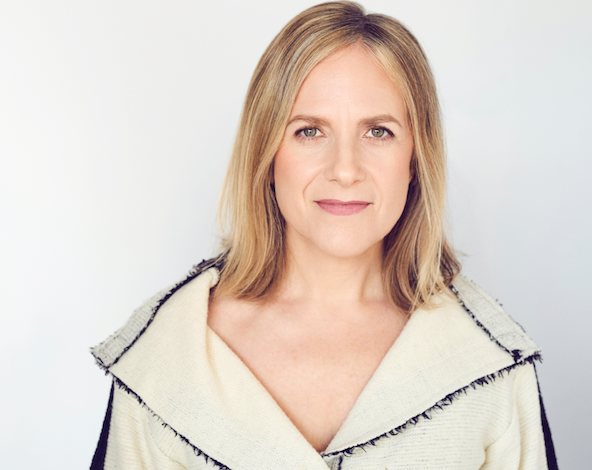A singer/songwriter who has collaborated with Jeff Lynne, Ryan Adams, Van Dyke Parks, and Rufus Wainwright, among others, Julianna Raye used her meditation practice as a way to remain grounded, studying with Shinzen Young, who she learned about through Leonard Cohen. That led her to start Unified Mindfulness, which is dedicated to teaching and training people in the system of mindful meditation developed by Shinzen. While building the site is her focus, she still records; “Hummingbirds and Harbor Lights,” a gently melancholic bossa nova from her upcoming album, Hush, can be heard below. We sat down with Julianna at a coffee shop in at the foot of the Hollywood Hills to talk about how meditation can help people dealing with grief. We have lightly edited our conversation for clarity and length.

In one sentence, what is Unified Mindfulness?
It’s a system of mindfulness meditation training designed by Shinzen Young. You can think of mindfulness meditation as a systematic development of a set of attention skills. Generally speaking, you develop your attention by focusing your attention on sensory experience in particular ways. In Unified Mindfulness we divide your experience in three ways: visual, auditory, somatic: what we see, hear, feel.
How can this be applied to grief?
Any experience happens in some combination of those sense categories, So, from a broad perspective, any experience, including grief, can be related to using the attention skills of mindful awareness. When you do that, it can have the effect of bringing relief, and have the effect of helping you manage the experience, and even helping convert the experience into something poignant, instead of something that you’re suffering from.
“Rather than saying it’s a way to get past grief, I’d say Mindfulness is a way to move through it.”
Is it a way of getting past it?
Rather than saying it’s a way to get past it, I’d say it’s a way to move through it. Because we tend to assume the experience itself is problematic, and if we didn’t have to feel it, it would be OK. This applies to any experience, not just discomfort or pain. We tend to assume we have to get rid of it in order to feel OK again. With Unified Mindfulness, you discover it’s that actually how we’re focusing on it that makes a difference in whether we’re suffering from an experience or not.
This is something you dealt with yourself.
I had been practicing for years when my mom fell ill. I had been practicing because I suffered with a lot emotional issues—depression—and I found it helpful. But even in finding it helpful, I struggled. I had a lot of doubts about what mindful practice was really giving me. On the other hand, it was helping. I’d do it, and the doubts would creep up, but I’d just keep doing it because I didn’t feel like I had anything else. I had tried therapy. I tried medication, but nothing seemed to work as well for me as meditation. But when my mom passed away, all the doubts of what mindfulness could do for me fell away. It had an undeniable positive impact to have the resource of that tool available to me. For the 2 ½ years, from the time she was diagnosed until she died, and the aftermath, my skills were by my side. I felt very fortunate that my way of relating to the situation—my body, and my mind knew how to respond because of the practice I had done.
How did it manifest itself?
When we got the news it was excruciating; I was devastated. She was my dearest friend, we had an unusually close connection. The wave of pain that hit me when I learned about it, and began to see her struggle…there’s nothing more painful than seeing someone you love suffer and not being able to do anything about it. I felt like I was watching her in the ring with Muhammed Ali, getting knocked over again and again and again. She had no means to protect herself in any way from the onslaught.
“We tend to view the pain of grief from loss as unredeeming, but that has not been my experience. Death has something truly magical to offer.”
But I knew how to work with that experience: to open up to the pain so I didn’t get stuck in it, so that it moved through me. I knew how to be clear about the pain and details about the pain: where it was located in my body and how intense it felt, the horror, the anger, the sadness, the frustration. I was able to identify them, and in the identification, which gave me the ability to see how the helplessness made the anger more intense, which made the fear more intense. That made the experience more manageable, less overwhelming. It helped it move through me, being able to be clear about it as an experience made it less overwhelming, and knowing how to concentrate my attention on the experience was really helpful. It enabled me to let the experience do its work. We tend to view the pain of grief from loss as unredeeming, but that has not been my experience. Death has something truly magical to offer.
How do you mean that?
Death is as much of a transformation as life. No one can deny there’s something miraculous about birth, and in my experience, there’s something miraculous about death. For instance, towards the end of her life my mom became more confused. She was at home, and she recognized us, but had become convinced that she was in a hospital that had been recreated to look like her house, note for note. But things got very simple. She would just look at me, and in a nonverbal way, share a loving connection. And she would repeat, ‘we’re so lucky., we’re so lucky.’ It went on for weeks. I got the full weight of that: we were lucky to know that kind of caring, that kind of love. It was a love that was personal, because it was between my mom and myself, but it was also impersonal. It went beyond my mom and me. That became clear to me when she died. That love—that abiding love—carried on. It awakened in me a level of gratitude that I had never experienced.
“When my mom died, what was born in me was a level of gratitude that has never gone away. It was as if she gifted me gratitude; it was something she gave to me in her passing.”
When my mom died, what was born in me was a level of gratitude that has never gone away. It was as if she gifted me gratitude; it was something she gave to me in her passing. If we are too stuck on the loss side of things, too caught up and mired in our emotions, if we don’t know how to be skillful in our emotional life, we miss the gifts that death is giving us.
Is that a matter of focus?
I would say in the focusing of my attention, gratitude was naturally revealed. What struck me was just how effortless is was. And I see a direct relationship between my willingness to live through grief mindfully, that I opened up to the pain, I detected all the aspects of grief, that I focused on it, and was willing to turn toward it, that converted the grief into gratitude.
Is there a correlation between this and Elisabeth Kubler-Ross’ Five Stages of Grief?
Yes. There’s what I lived through on a personal level and there’s how the experience was transcended. I lived through what everyone lives though: denial, anger, sadness. At the same time, that experience was changing me for the better and I felt that happening very clearly.
“I felt profoundly fortunate to be able to process my own pain, which made me that much more available to my mom as she was dying. You take care of yourself as you are taking care of others.”
How so?
I’ll give you an example: I was taking a yoga class a couple of weeks after her funeral, and I felt tremendous grief churning through me, a lot of pain. I felt very small and very vulnerable and inadequate in the face of the large scale of the grief I was experiencing. I was doing my best to work with it; to be clear about it as an experience. I was choosing to focus on it. After class, the woman who was practicing next to me came over and said, “you are such a joy to practice next to.” She had no idea what I was going though. I was in agony, but the people around me were experiencing me accepting my inner condition. You’re fully experiencing it and feeling it, but I think that translates into a kind of radical acceptance that people on some level can feel.
I felt profoundly fortunate to be able to process my own pain, which made me that much more available to my mom as she was dying. You take care of yourself as you are taking care of others.

Leave a Reply